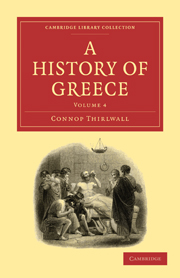Book contents
- Frontmatter
- Contents
- CHAPTER XXVII FROM THE CLOSE OF THE SICILIAN EXPEDITION TO THE BEGINNING OF THE RUPTURE BETWEEN THE SPARTANS AND ALCIBIADES
- CHAP. XXVIII FROM THE BEGINNING OF THE RUPTURE BETWEEN THE SPARTANS AND ALCIBIADES TO THE OVERTHROW OF THE FOUR HUNDRED AT ATHENS, AND THE RESTORATION OF ALCIBIADES
- CHAP. XXIX FROM THE OVERTHROW OF THE FOUR HUNDRED TO THE BATTLE OF NOTIUM
- CHAP. XXX FROM THE BATTLE OF NOTIUM TO THE END OF THE PELOPONNESIAN WAR
- CHAP. XXXI FROM THE END OF THE PELOPONNESIAN WAR TO THE REESTABLISHMENT OF DEMOCRACY AT ATHENS
- CHAP. XXXII RETROSPECTIVE SURVEY OF THE INTERNAL CONDITION OF ATHENS DURING THE PELOPONNESIAN WAR, CARRIED FORWARD TO THE RENEWAL OF HOSTILITIES BETWEEN ATHENS AND SPARTA
- CHAP. XXXIII THE EXPEDITION OF CYRUS THE YOUNGER
- CHAP. XXXIV THE RETURN OF THE GREEKS
- CHAP. XXXV FROM THE RENEWAL OF HOSTILITIES BETWEEN SPARTA AND PERSIA TO THE DEATH OF LYSANDER
- CHAP. XXXVI FROM THE DEATH OF LYSANDER TO THE PEACE OF ANTALCIDAS
- APPENDIX
CHAP. XXXV - FROM THE RENEWAL OF HOSTILITIES BETWEEN SPARTA AND PERSIA TO THE DEATH OF LYSANDER
Published online by Cambridge University Press: 05 July 2011
- Frontmatter
- Contents
- CHAPTER XXVII FROM THE CLOSE OF THE SICILIAN EXPEDITION TO THE BEGINNING OF THE RUPTURE BETWEEN THE SPARTANS AND ALCIBIADES
- CHAP. XXVIII FROM THE BEGINNING OF THE RUPTURE BETWEEN THE SPARTANS AND ALCIBIADES TO THE OVERTHROW OF THE FOUR HUNDRED AT ATHENS, AND THE RESTORATION OF ALCIBIADES
- CHAP. XXIX FROM THE OVERTHROW OF THE FOUR HUNDRED TO THE BATTLE OF NOTIUM
- CHAP. XXX FROM THE BATTLE OF NOTIUM TO THE END OF THE PELOPONNESIAN WAR
- CHAP. XXXI FROM THE END OF THE PELOPONNESIAN WAR TO THE REESTABLISHMENT OF DEMOCRACY AT ATHENS
- CHAP. XXXII RETROSPECTIVE SURVEY OF THE INTERNAL CONDITION OF ATHENS DURING THE PELOPONNESIAN WAR, CARRIED FORWARD TO THE RENEWAL OF HOSTILITIES BETWEEN ATHENS AND SPARTA
- CHAP. XXXIII THE EXPEDITION OF CYRUS THE YOUNGER
- CHAP. XXXIV THE RETURN OF THE GREEKS
- CHAP. XXXV FROM THE RENEWAL OF HOSTILITIES BETWEEN SPARTA AND PERSIA TO THE DEATH OF LYSANDER
- CHAP. XXXVI FROM THE DEATH OF LYSANDER TO THE PEACE OF ANTALCIDAS
- APPENDIX
Summary
The motives which induced the Spartan government to declare itself in favour of Cyrus in his contest with his elder brother, were not perhaps without a mixture of personal feelings, but they were certainly not pure gratitude and goodwill. It no doubt perceived that it would be conferring a weighty obligation on one of the rivals, who might become a still more powerful and useful ally than he had hitherto been, while its forbearance would be but little prized by the other. The issue of the enterprise of Cyrus could not inspire it with much uneasiness. If he should not fully succeed, there might still be a prospect of dividing or weakening the Persian empire; and if he should utterly fail, it had nothing to dread but a war with Persia; an event to which it had probably begun already to look forward more with hope than with fear. The victory of Artaxerxes soon afforded it an occasion for manifesting the new spirit which animated its councils. While the Greeks were on their return, Tissaphernes was sent down to the West to receive the reward of his signal services, having been appointed to the government of the provinces which had been before subject to Cyrus, in addition to his own satrapy, and invested with the like superintending authority as had been given to the prince. He now claimed the dominion of the Ionian cities as included within his new province; but he found them very unwilling to submit to him.
- Type
- Chapter
- Information
- A History of Greece , pp. 359 - 398Publisher: Cambridge University PressPrint publication year: 2010First published in: 1837



